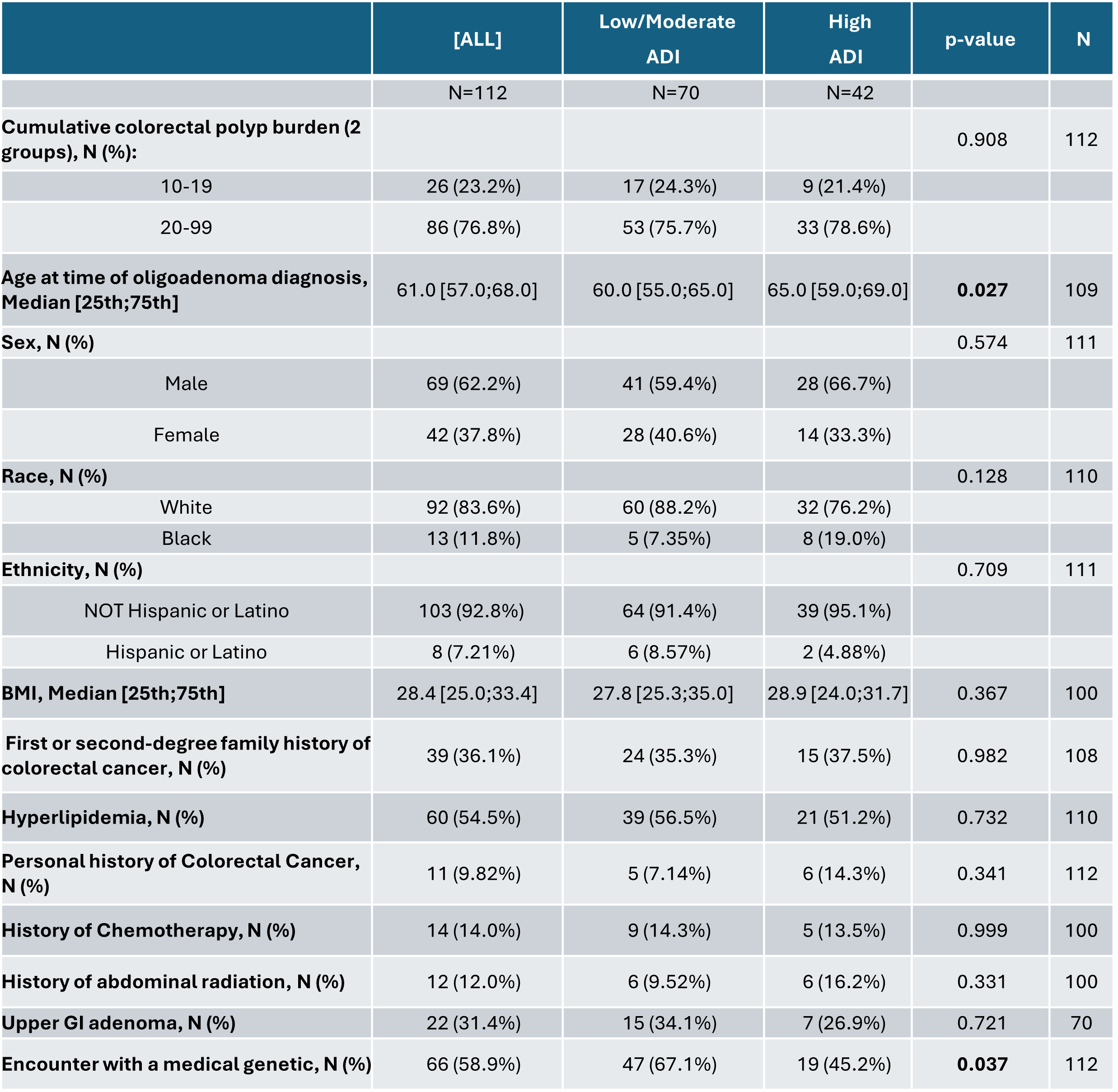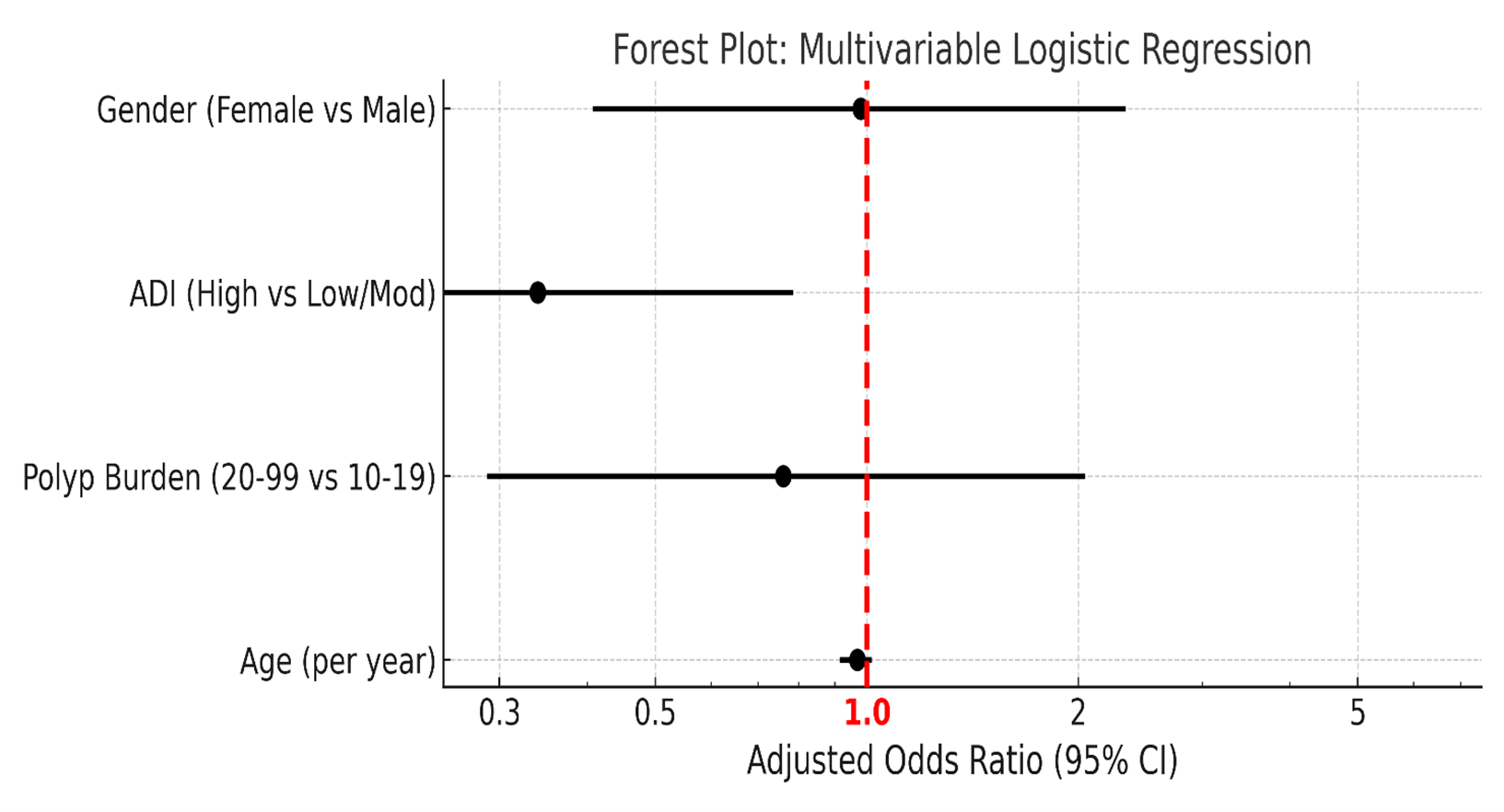Sunday Poster Session
Category: Colon
P0317 - Neighborhood Socioeconomic Disadvantage (Area Deprivation Index) and Genetic Counseling Attendance in Patients Referred for Genetic Testing for Colorectal Adenomatous Oligopolyposis: A Real-World Retrospective Study
Sunday, October 26, 2025
3:30 PM - 7:00 PM PDT
Location: Exhibit Hall
- AM
Ahmed N. Mohamed, MD (he/him/his)
Cleveland Clinic Foundation
Charleston, WV
Presenting Author(s)
Ahmed N.. Mohamed, MD1, Moath Albliwi, MD2, Qijun Yang, MS3, Chabaklo Khodor, MD4, Islam Mohamed, MD2, Yara Shatnawi, MD2, Sara Shatnawy, MD5, Muaz Alsabbagh, MD6, Hazem Abosheaishaa, MD7, Carol A.. Burke, MD, MACG3, Carole Macaron, MD3
1Cleveland Clinic Foundation, South Euclid, OH; 2Cleveland Clinic Foundation, Cleveland, OH; 3Cleveland Clinic, Cleveland, OH; 4Cleveland Clinic Florida, Cleveland, OH; 5Jordan University of Science and Technology, Irbid, Irbid, Jordan; 6Detroit Medical Center/Wayne State University, Cleveland, OH; 7Mount Sinai West, Icahn School of Medicine at Mount Sinai, Queens, NY
Introduction: Clinical guidelines advocate for genetic counseling in patients with 10 or more colorectal adenomas. However, disparities in access may limit testing uptake and delay the diagnosis of hereditary syndromes. The Area Deprivation Index (ADI), a validated measure of neighborhood-level socioeconomic disadvantage, includes factors such as income, education, employment, and housing. This study aims to assess the impact of ADI on the likelihood of completing genetic counseling in this population.
Methods: We conducted a retrospective chart review of adults diagnosed with 10–99 cumulative colorectal adenomas, without a family history suggestive of hereditary colorectal cancer syndromes, at the Cleveland Clinic between March 2009 and December 2023. ADI was categorized into tertiles (low, moderate, high deprivation) using national percentiles. The primary outcome was completion of a genetic counseling encounter among those referred. Univariable and multivariable logistic regression were used to assess associations between ADI, demographic, and clinical factors and counseling completion.
Results: A total of 118 patients with 10–99 colorectal adenomas were referred for genetic counseling; 66 (59%) attended their appointments. Attendance rates by ADI tertile were 63.3% in the low, 70% in the moderate, and 45.2% in the high deprivation groups. Patients from high ADI areas were older at diagnosis compared to those from low/moderate ADI areas (median age 65 vs. 60 years; p = 0.027). No other factors were statistically significant (Table 1). In both univariable and multivariable logistic regression, high ADI was associated with lower odds of attending a genetic appointment compared to low/moderate ADI (unadjusted OR 0.31, p = 0.005; adjusted OR 0.34, p = 0.01). Other variables, including age at diagnosis, race, sex, and cumulative adenoma count, were not significantly associated with attendance in either model (Figure 1).
Discussion: In our cohort of patients referred for genetic counseling for adenomatous oligopolyposis, ADI was the only factor independently associated with lower attendance at genetic counseling visits, highlighting it as a key barrier to follow-up after referral and underscoring the need to explore additional individual- and system-level factors that may impact access to genetic services.

Figure: Table 1: Demographics and clinic factors by ADI subgroups: Low/Moderate vs High

Figure: Figure 1: Forest plot illustrating the results of the multivariable logistic regression analysis
Disclosures:
Ahmed Mohamed indicated no relevant financial relationships.
Moath Albliwi indicated no relevant financial relationships.
Qijun Yang indicated no relevant financial relationships.
Chabaklo Khodor indicated no relevant financial relationships.
Islam Mohamed indicated no relevant financial relationships.
Yara Shatnawi indicated no relevant financial relationships.
Sara Shatnawy indicated no relevant financial relationships.
Muaz Alsabbagh indicated no relevant financial relationships.
Hazem Abosheaishaa indicated no relevant financial relationships.
Carol Burke: emtora biosciences – Grant/Research Support. lumabridge – Consultant. myriad – Food and beverage. Natera – Food and beverage.
Carole Macaron indicated no relevant financial relationships.
Ahmed N.. Mohamed, MD1, Moath Albliwi, MD2, Qijun Yang, MS3, Chabaklo Khodor, MD4, Islam Mohamed, MD2, Yara Shatnawi, MD2, Sara Shatnawy, MD5, Muaz Alsabbagh, MD6, Hazem Abosheaishaa, MD7, Carol A.. Burke, MD, MACG3, Carole Macaron, MD3. P0317 - Neighborhood Socioeconomic Disadvantage (Area Deprivation Index) and Genetic Counseling Attendance in Patients Referred for Genetic Testing for Colorectal Adenomatous Oligopolyposis: A Real-World Retrospective Study, ACG 2025 Annual Scientific Meeting Abstracts. Phoenix, AZ: American College of Gastroenterology.
1Cleveland Clinic Foundation, South Euclid, OH; 2Cleveland Clinic Foundation, Cleveland, OH; 3Cleveland Clinic, Cleveland, OH; 4Cleveland Clinic Florida, Cleveland, OH; 5Jordan University of Science and Technology, Irbid, Irbid, Jordan; 6Detroit Medical Center/Wayne State University, Cleveland, OH; 7Mount Sinai West, Icahn School of Medicine at Mount Sinai, Queens, NY
Introduction: Clinical guidelines advocate for genetic counseling in patients with 10 or more colorectal adenomas. However, disparities in access may limit testing uptake and delay the diagnosis of hereditary syndromes. The Area Deprivation Index (ADI), a validated measure of neighborhood-level socioeconomic disadvantage, includes factors such as income, education, employment, and housing. This study aims to assess the impact of ADI on the likelihood of completing genetic counseling in this population.
Methods: We conducted a retrospective chart review of adults diagnosed with 10–99 cumulative colorectal adenomas, without a family history suggestive of hereditary colorectal cancer syndromes, at the Cleveland Clinic between March 2009 and December 2023. ADI was categorized into tertiles (low, moderate, high deprivation) using national percentiles. The primary outcome was completion of a genetic counseling encounter among those referred. Univariable and multivariable logistic regression were used to assess associations between ADI, demographic, and clinical factors and counseling completion.
Results: A total of 118 patients with 10–99 colorectal adenomas were referred for genetic counseling; 66 (59%) attended their appointments. Attendance rates by ADI tertile were 63.3% in the low, 70% in the moderate, and 45.2% in the high deprivation groups. Patients from high ADI areas were older at diagnosis compared to those from low/moderate ADI areas (median age 65 vs. 60 years; p = 0.027). No other factors were statistically significant (Table 1). In both univariable and multivariable logistic regression, high ADI was associated with lower odds of attending a genetic appointment compared to low/moderate ADI (unadjusted OR 0.31, p = 0.005; adjusted OR 0.34, p = 0.01). Other variables, including age at diagnosis, race, sex, and cumulative adenoma count, were not significantly associated with attendance in either model (Figure 1).
Discussion: In our cohort of patients referred for genetic counseling for adenomatous oligopolyposis, ADI was the only factor independently associated with lower attendance at genetic counseling visits, highlighting it as a key barrier to follow-up after referral and underscoring the need to explore additional individual- and system-level factors that may impact access to genetic services.

Figure: Table 1: Demographics and clinic factors by ADI subgroups: Low/Moderate vs High

Figure: Figure 1: Forest plot illustrating the results of the multivariable logistic regression analysis
Disclosures:
Ahmed Mohamed indicated no relevant financial relationships.
Moath Albliwi indicated no relevant financial relationships.
Qijun Yang indicated no relevant financial relationships.
Chabaklo Khodor indicated no relevant financial relationships.
Islam Mohamed indicated no relevant financial relationships.
Yara Shatnawi indicated no relevant financial relationships.
Sara Shatnawy indicated no relevant financial relationships.
Muaz Alsabbagh indicated no relevant financial relationships.
Hazem Abosheaishaa indicated no relevant financial relationships.
Carol Burke: emtora biosciences – Grant/Research Support. lumabridge – Consultant. myriad – Food and beverage. Natera – Food and beverage.
Carole Macaron indicated no relevant financial relationships.
Ahmed N.. Mohamed, MD1, Moath Albliwi, MD2, Qijun Yang, MS3, Chabaklo Khodor, MD4, Islam Mohamed, MD2, Yara Shatnawi, MD2, Sara Shatnawy, MD5, Muaz Alsabbagh, MD6, Hazem Abosheaishaa, MD7, Carol A.. Burke, MD, MACG3, Carole Macaron, MD3. P0317 - Neighborhood Socioeconomic Disadvantage (Area Deprivation Index) and Genetic Counseling Attendance in Patients Referred for Genetic Testing for Colorectal Adenomatous Oligopolyposis: A Real-World Retrospective Study, ACG 2025 Annual Scientific Meeting Abstracts. Phoenix, AZ: American College of Gastroenterology.
